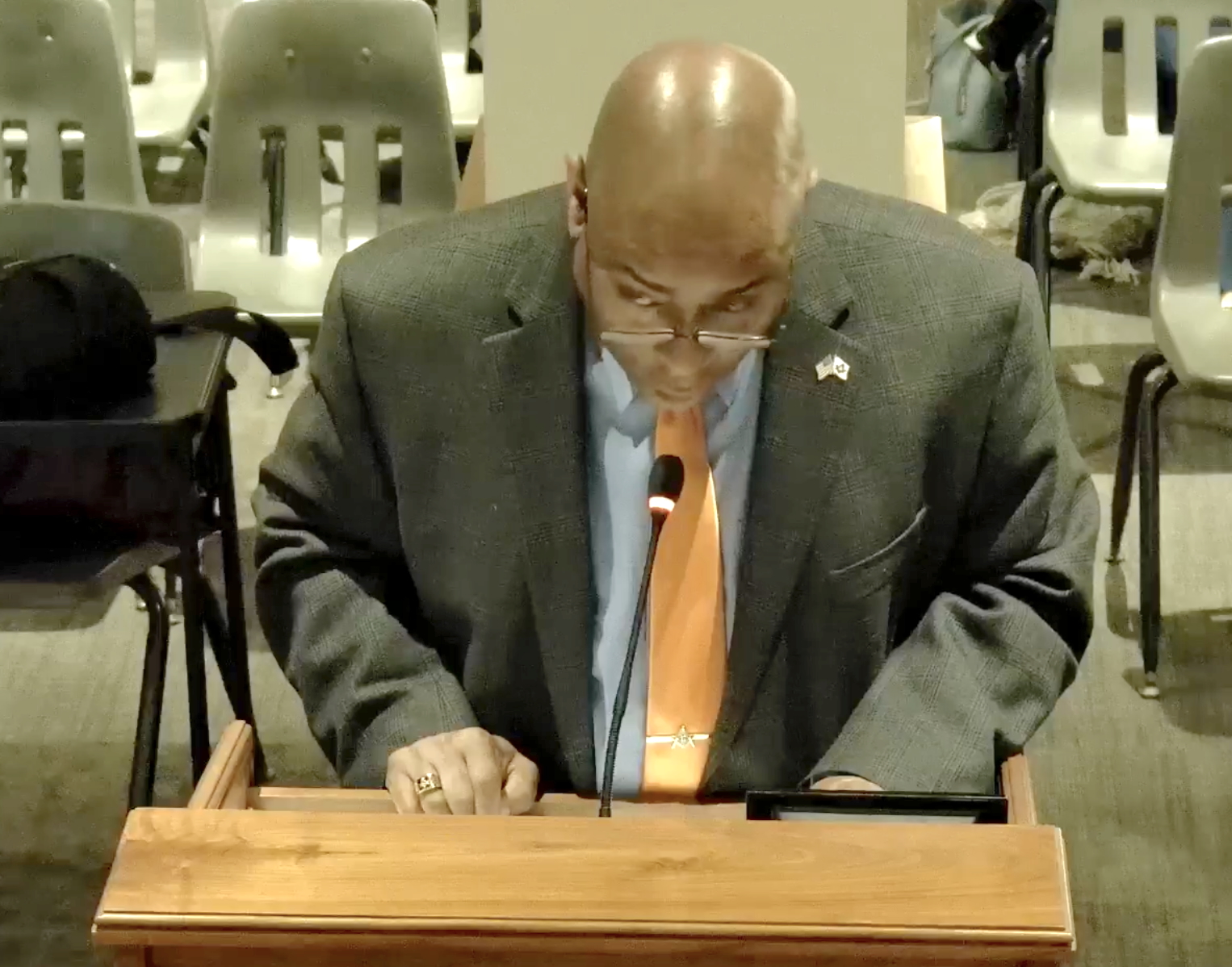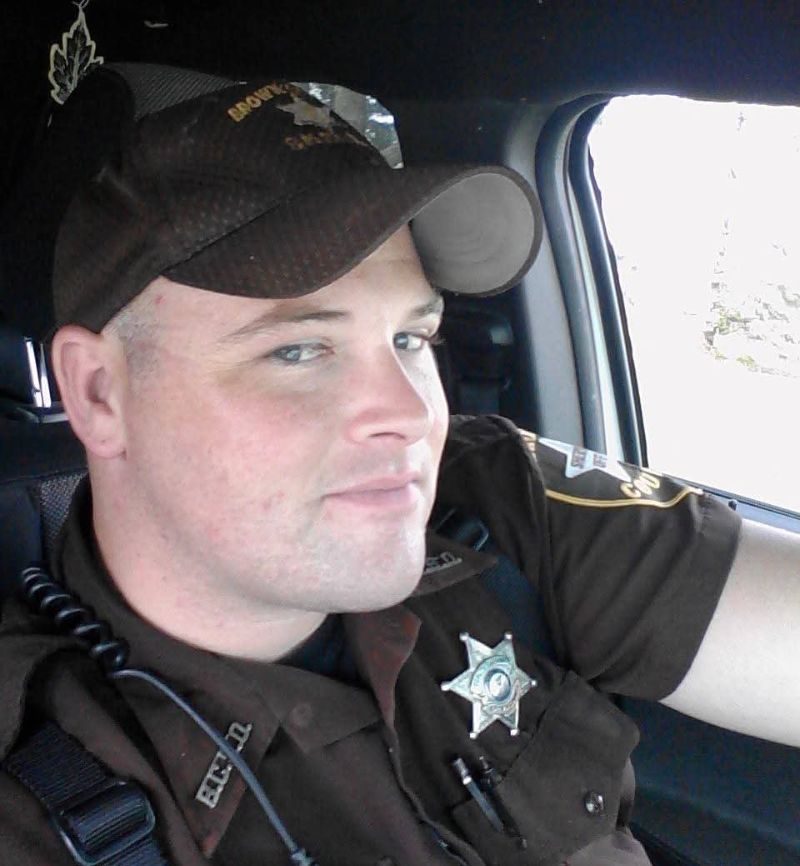Human Rights Commission chair admonishes City Council for silence in response to email about ‘anti-white racism’

QUINCY — Mark Philpot, chairman of the Human Rights Commission, chastised the Quincy City Council on Monday night for its inaction after members recently received a letter that Philpot said was “contrary to promoting good racial harmony within our fair city.”
Philpot spoke for three minutes during the public comment portion of the meeting. He brought to the attention of the aldermen chapter 40.157 of the city code, which said “the commission shall advise the mayor and city officials of the city in the interest of equal opportunity, understanding and good will towards all persons, regardless of race, color, creed or national origin, that these may be promoted by city officials.”
Philpot said after Monday’s meeting that the Human Rights Commission received an email complaint on May 22 from a citizen who disagreed with the city’s decision to place honorary street signs at intersections on Eighth Street in remembrance of civil rights leader Martin Luther King Jr. Twenty-two signs were put in place in 2005, and 15 more were installed in 2011.
The author of the letter, who Philpot did not name, allegedly called King an “anti-white degenerate” and that people needed to know the truth about him. Philpot said the letter said it was “an embarrassment” to have King’s name along Eighth Street and that it was “an affront” to all the people of Quincy and Adams County.
“We have received complaints from this Individual before,” Philpot said. “The basis of his complaints are that the existence of certain events, i.e., Juneteenth, Martin Luther King Day and things of that nature are ‘anti-white’ and therefore are something that should not be discussed or espoused in the public eye. To kind of quote one of his rantings, 94 percent of the population should not have to be subjected to things like Juneteenth because it’s ‘anti-white racism.’”
The Human Rights Commission disseminated a copy of the email to its members before its June 5 meeting. Philpot said the commission eventually reached out to the author of the letter and offered an opportunity to come to a future meeting and share their viewpoint. Philpot said the author has declined the offer.
Philpot said a similar offer was made when a similar letter was received two or three years ago.
“If that is really his viewpoint, (the Human Rights Commission) would give him an opportunity to have his say in front of an audience and to share his viewpoint, because HRC does not discriminate against anyone,” Philpot said. ”HRC allows anyone in the community to come share their viewpoint, regardless of what that is.
“Now with every right comes responsibility. If you decide you want to come to HRC and share those views, although they might be somewhat unpopular, a person should, rationally as a part of the dialogue, be prepared to hear opposing viewpoints. We encourage opposing viewpoints. We don’t all just want to be on a singular page. That’s not how we learn. That’s not how we grow as a community.”
Philpot said a more strongly worded letter containing racial slurs had been sent nine days earlier to the 14 aldermen.
“It was definitely more pointed than (the Human Rights Commission) email,” Philpot said. “The one directed to City Council actually used the ‘N word.’ I would have to theorize that the city’s most recent decision to make Juneteenth an official holiday might have had some play with that.”
The Quincy City Council unanimously voted on May 19 to approve a resolution recognizing Juneteenth as an official holiday in the City of Quincy, establishing June 19 as an annual paid holiday for all City of Quincy employees not part of a collective bargaining agreement.
The only alderman who publicly responded to the letter was Ben Uzelac (D-7).
“Your comment is a slap in the face for the people of Quincy and Adams County,” Uzelac wrote in an email reply sent to the other aldermen as well as the author of the original email and provided to Muddy River News. “There is no room for racism here. Regardless, thanks for bringing that to our attention. I’m actually planning on donating my own money to make the signs bigger.”
Contacted after Monday’s meeting, Uzelac didn’t back down from his statement.
“I don’t think there’s room for racism at all, but especially not in Quincy, Illinois or Adams County,” he said. “I feel so strongly about it that I’m willing to say that kind of stuff to people.
“There’s kind of two schools of thought. The first is, yeah, there are some crummy people out there, but there are also people who are just ignorant. On the off chance this guy is not a complete bigot and just was raised this way. I want to give people a chance to learn and grow. At the same time, if he is a huge bigot, well, screw you.”
Philpot was upset with the silence from the other aldermen.
“Were it not for the courage of a particular individual, this email would have gone unnoticed,” he said. “But we have the receipts. We are disappointed that members of this body did not see fit to consult, express the same or otherwise comment on (the email’s) contents.”
He told the aldermen to “be the same person on Monday that you are Sunday morning.”
“If you see hatred, confront it. If you hear hate speech, denounce it,” Philpot said to the aldermen. “If the comments had been made contrary to our city’s majority European heritage, there would be backlash. If the comments were made against our majority religious community, there will be outrage. Why is any other community somehow less than when it is besmirched?
“All we are saying is that, if we are truly one Quincy, that when evil voices espouse what is contrary to our core beliefs, that our elected officials say in a united voice, ‘Not here.’ We must all fear evil men, but there is another kind of evil which we must fear most, and that is the indifference of good men.”
Philpot said after the meeting that the focus of the Human Rights Commission is not to be an agitator or a “rabble rouser.”
“It is meant to bring us together by learning more about one another and learning more about our commonalities and focusing on those as opposed to our differences,” he said. “We do share more commonalities than we do differences, and that’s why we try to provide that vehicle to be able to do that.”
He admitted his statement was an “admonishment” of the City Council.
“As elected officials, when you see something, you should say something,” Philpot said. “If it’s something that you wouldn’t want to be said to you at church, it shouldn’t be something that’s said to you when you’re sitting up on the dais on the City Council.”
Miss Clipping Out Stories to Save for Later?
Click the Purchase Story button below to order a print of this story. We will print it for you on matte photo paper to keep forever.

